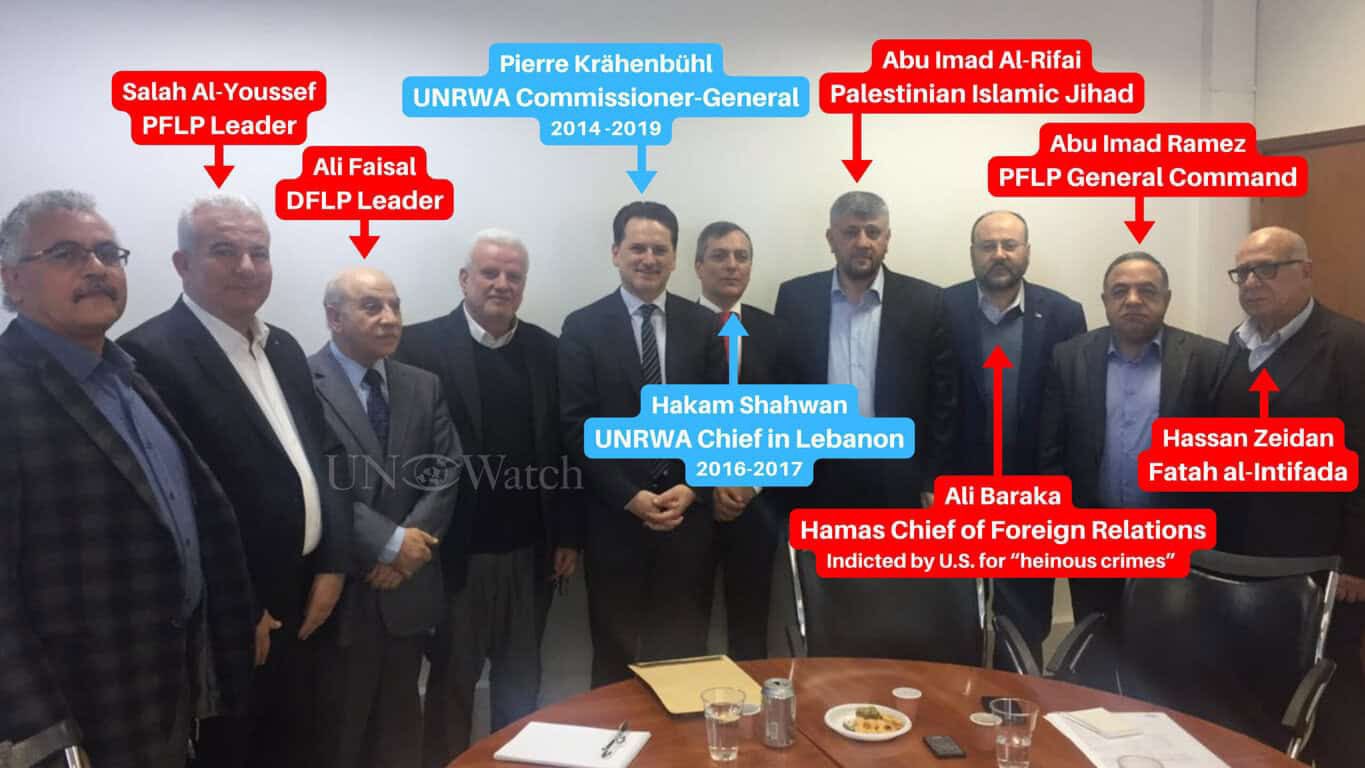 UNRWA wpada w panikę wobec wszystkich nowych rewelacji, które pokazują jej współudział w terrorze. Jej reakcja? Więcej kłamstw!
UNRWA wpada w panikę wobec wszystkich nowych rewelacji, które pokazują jej współudział w terrorze. Jej reakcja? Więcej kłamstw!
Elder of Ziyon
Tłumaczenie: Małgorzata Koraszewska
21 listopada UN Watch poinformował o ważnym wydarzeniu:
UN Watch ujawnił, że poprzedni szef UNRWA, Pierre Krahenbuhl, wielokrotnie spotykał się z liderami palestyńskich organizacji terrorystycznych, włącznie ze spotkaniem, na którym wezwał do ich tajnego partnerstwa i jedności. Praktyka ta jest kontynuowana pod przewodnictwem obecnego komisarza UNRWA, Philippe’a Lazzariniego.
Na spotkaniu w Bejrucie w lutym 2017 r. Krahenbuhl spotkał się z szefem stosunków zagranicznych Hamasu, Alim Baraką, który niedawno został oskarżony przez rząd USA o „ohydne zbrodnie”. Baraka zarządzał relacjami Hamasu z Teheranem i innymi reżimami, w tym Syrią i Irakiem. Kilka dni po masakrze dokonanej przez Hamas 7 października Baraka twierdził, że grupa planowała atak od dwóch lat i ujawnił istnienie od 2021 r. Palestyńskiego Wspólnego Centrum Operacyjnego wśród różnych frakcji. „Sprawiliśmy, że myśleli, że Hamas jest zajęty rządzeniem Gazą i że chce skupić się na 2,5 miliona Palestyńczyków tam mieszkających i całkowicie porzucił opór. Przez cały czas, pod stołem, Hamas przygotowywał się do tego wielkiego ataku” — powiedział Baraka.
Podczas tego samego spotkania szef UNRWA spotkał się również z Abu Imadem al-Rifaim, przywódcą Palestyńskiego Islamskiego Dżihadu w Libanie, który chwalił się wysłaniem w 2003 r. fali zamachowców-samobójców do Bagdadu, którzy mieli zabić amerykańskich i brytyjskich żołnierzy.
Na spotkaniu Krahenbuhl w imieniu UNRWA podkreślił „ducha partnerstwa” między grupami terrorystycznymi a UNRWA. Poprosił ich, by prywatnie kwestionowali decyzje UNRWA, a on może je zmienić lub „podrzeć”, jednocześnie nalegając, aby ich „dyskusje nie były upubliczniane”.
Gdyby ich spotkania dostałyby się do wiadomości publicznej, powiedział Krahenbuhl, który obecnie kieruje Międzynarodowym Czerwonym Krzyżem, „mogłoby to podważyć naszą wiarygodność” — i „doprowadzić do utraty zaufania między krajami darczyńcami a UNRWA, co mogłoby skutkować zmniejszeniem lub nawet wstrzymaniem finansowania”.
W dyskusjach z przywódcami terrorystów Krahenbuhl przyznał, że rola UNRWA nie polega przede wszystkim na dystrybucji pomocy. „Nie porzucimy powierzonej nam roli historycznego świadka niesprawiedliwości, jaka spotkała naród palestyński” – powiedział.
To jest tak obciążające, jak tylko może być. Dowodzi, że UNRWA współpracuje z grupami terrorystycznymi i próbuje to ukryć. Dowodzi, że główną misją UNRWA nie jest pomoc palestyńskim „uchodźcom”, ale „rola historycznego świadka” poprzez utrwalanie fałszywego problemu uchodźców.
Dochodzi to do szeregu dowodów, że szkoły UNRWA były prowadzone przez przywódców Hamasu, a uczniowie są uczeni nienawiści i atakowania Izraela. Ponadto pracownicy UNRWA kradną pomoc przeznaczoną dla mieszkańców Gazy – według samych mieszkańców Gazy.
UNRWA nie może kwestionować tych faktów. Dlatego odpowiada, nazywając je „dezinformacją”.
Philippe Lazzarini, Komisarz Generalny UNRWA pisze:
Rozprzestrzenianie dezinformacji przeciwko UNRWA ma na celu wywołanie chaosu i odwrócenie uwagi od politycznych celów likwidacji agencji.
Odwraca to uwagę od tego, co naprawdę ważne: niszczycielskiego wpływu wojny w Strefie Gazy i regionie na ludność cywilną i pracy, jaką nasze zespoły UNRWA nadal wykonują, aby ratować ludzkie życia.
Rozprzestrzenianie się fałszywych informacji nie ustaje i szkodzi uchodźcom palestyńskim, podważając pozycję jedynej agencji ONZ zajmującej się zapewnianiem pomocy humanitarnej, edukacji i podstawowej opieki zdrowotnej jednej z najbardziej bezbronnych społeczności w regionie.
UNRWA jest instrumentem społeczności międzynarodowej powołanym w celu zajęcia się losem uchodźców palestyńskich w przypadku braku alternatywy i do czasu znalezienia sprawiedliwego rozwiązania politycznego.
Co najważniejsze, ta kampania dezinformacyjna naraża życie moich kolegów z okupowanych terytoriów palestyńskich, w tym z Gazy, na dodatkowe ryzyko.
Zanim się podzielisz, sprawdź dwukrotnie źródło i zakwestionuj intencję. Zapytaj, dlaczego ta informacja jest dostępna?
Unikaj stania się echem dezinformacji i podsycania nienawiści.
To jest bardziej szkodliwe niż myślisz.
Czym dokładnie jest ta dezinformacja i fałszywe informacje? Czy Lazzarini zaprzeczył transkrypcji słów swojego poprzednika, który przymilał się do przywódców terrorystycznych? Czy UNRWA zaprzeczyła, że przywódcy Hamasu byli również dyrektorami szkół? Czy UNRWA przedstawiła jakiekolwiek dowody na to, że UN Watch kłamie?
Oczywiście, że nie. Ponieważ nie mogą.
Jedynym odwróceniem uwagi, jakie ma miejsce, jest to, że UNRWA stara się jak może, aby odwrócić uwagę od własnego współudziału w terrorze.
Twierdzenie, że UNRWA zapewnia pewne usługi potrzebującym osobom i dlatego nie wolno jej tknąć, jest jak mówienie tego samego o Hamasie, Islamskim Dżihadzie i Hezbollahu, którzy wszyscy prowadzą programy pomocy społecznej. To tak, jakby twierdzić, że chirurg, który nigdy nie ukończył szkoły medycznej, nie powinien tracić licencji, skoro tylko 10% jego pacjentów zmarło z powodu jego niekompetencji.
I nie, te rewelacje nie mają na celu „odwrócenia uwagi” od politycznych celów likwidacji agencji. Mają one bardzo wyraźnie na celu likwidację agencji.
Należało to zrobić dziesiątki lat temu.
Zawartość publikowanych artykułów i materiałów nie reprezentuje poglądów ani opinii Reunion’68,
ani też webmastera Blogu Reunion’68, chyba ze jest to wyraźnie zaznaczone.
Twoje uwagi, linki, własne artykuły lub wiadomości prześlij na adres:
webmaster@reunion68.com





